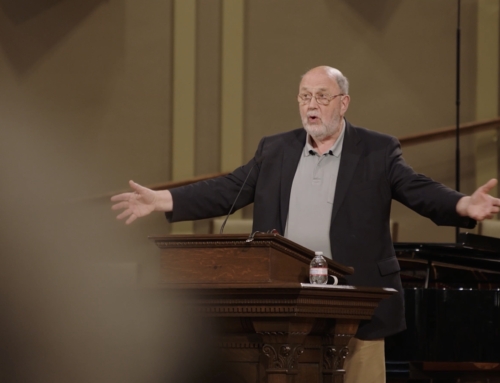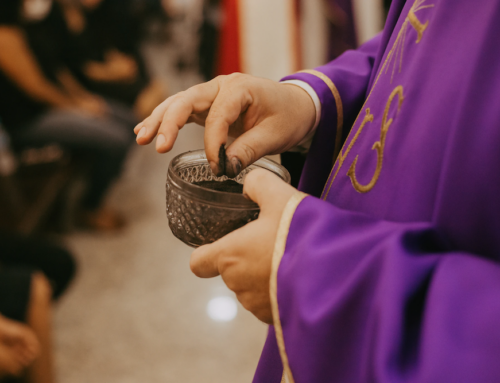The streets are empty. The hospitals are crowded. The church is distributed into households. And no one knows how long this will go on or how bad it will get. In these moments of powerlessness, we can recover the lost practice of lament. N. T. Wright wrote a beautiful piece for Time this week on resisting the temptation to offer explanations for our current crisis. He invited us to remember that Christianity offers us a way to lament that leads to hope: “It is no part of the Christian vocation, then, to be able to explain what’s happening and why. In fact, it is part of the Christian vocation not to be able to explain—and to lament instead. As the Spirit laments within us, so we become, even in our self-isolation, small shrines where the presence and healing love of God can dwell.”
But what exactly is a lament? Is it a gripe session? Is it venting? Is it a synonym for grief? The Book of Psalms—an ancient collection of songs and prayers from a people who were no strangers to suffering—can guide us in this practice.
1. Lament is a form of praise.
Old Testament scholars estimate that two-thirds of the psalms are laments. Yet the title of the compilation is “praises” (Hebrew tehillim). How could a collection which includes so many complaints be considered praise?
It’s helpful to define our terms. In common usage, the words lament and complaint are interchangeable. But in the Scripture, complaint and lament occur in different contexts and can be distinguished as different concepts. In the wilderness, Israel complained to God about the lack of bread and meat and water (Exodus 16-17). They assumed the worst about God: He wants to kill us! The people who had been dramatically rescued from Egypt and saved through the Red Sea turned on their Rescuer, painting Him as the villain. Their complaints were actually a way of putting God on trial; they were “testing” God. But in the psalms, Israel asks God to answer according to His unfailing love, because He is a God of justice and righteousness, and because He has been faithful in the past. By contrasting Israel in the wilderness with Israel in worship, we can say that a complaint is an accusation against God that maligns His character, but a lament is an appeal to God based on confidence in His character.
2. Lament is a proof of the relationship.
Israel brought their lament to God in the psalms on the basis of His covenant with them. These prayers and songs were not vain attempts to convince a distant deity to notice them. They were not like the priests of Baal dancing and cutting themselves to conjure a response. These were a people whom YHWH—the sole sovereign creator—had called His “firstborn”. They were asking their Father to act accordingly.
On a Saturday morning, when my wife and I are trying to sleep in until that luxurious hour of 8am but our younger children are hungry for breakfast, they don’t run outside to the neighbor begging for food. They come boldly into our bedroom asking for what they need. “Will you please make me some eggs?!” We are tempted in those moments to get upset, but we should be honored by their request. It is in itself proof of our relationship with them.
The reverse of this scene is tragically described by Dr. Russell Moore in his book, Adopted for Life. Moore describes going to an orphanage in Russia as they were in the process of pursuing adoption. The silence from the nursery was eerie. The babies in the cribs never cried. Not because they never needed anything, but because they had learned that no one cared enough to answer. Children who are confident of the love of a caregiver cry. For the Christian, our lament, when taken to our Father in heaven, is proof of our relationship with God, our connection to a great Caregiver.
3. Lament is a pathway to intimacy with God.
A few years ago, I read a stunning article by psychologist Bonnie Poon Zahl on attachment theory and our relationship with God. She describes attachment theory as an explanation of “how people learn to experience and respond to separation and distress in the context of core, close relationships from very early on in their lives.” Drawing on both John Bowlby and Mary Ainsworth, Zahl explains the three types of attachment—a secure attachment, an anxious-avoidant attachment, or an anxious-ambivalent attachment. From Ainsworth’s research, an “anxious-avoidant” child didn’t care when they were separated or reunited with their parents, and only wanted to play alone; “anxious-ambivalent” children “clung to their parents, and were extremely upset when their parents left” and “were difficult to soothe” even when their parents returned, seeming “to be angry at their parents for leaving.” Zahl writes that research “confirms the tendency to see God as an attachment figure and the tendency to think about one’s relational dynamics with God along the same two dimensions of human attachment: anxiety about abandonment and avoidance of intimacy.”
When I read Zahl’s article, I thought about the value of honesty in the Psalms. By laying every emotion and every experience before YHWH, their covenant God, the psalmist was reinforcing a bond of intimacy, affirming an attachment. Just as God made covenant with Abraham by the breaking apart of animals, so Israel embodied the bond of the covenant by breaking open their hearts before God. The Torah was organized into five books of God’s instruction—His word to His people; the Psalms are organized into five books, guiding us in how to “answer God”. The God who speaks calls us into relationship. Lament is one of the ways we respond.
4. Lament is a prayer for God to act.
Lament in the Bible is not simply an outlet for our frustrations. Though venting may be proven to be beneficial in and of itself, a lament is a form of prayer. And prayer is not passive. Many of the laments in the psalms are calls to action. They plead with God to pay attention to them and to act on their behalf. In fact, many Old Testament scholars identify “petition” as an essential element of a lament psalm. For example, the Hebrew word for “hear”, shema, appears 79 times, as the psalmist implores God to listen attentively to their cry. The psalmist appeals to God’s character and covenant and asks for His attention and action.
The New Testament takes us further. When Jesus taught His disciples to pray, He wasn’t giving them something cute to do to pass the time. He was inviting them to participate in the arrival of the Kingdom. In Paul’s epistles, his prayers were not the preamble but the premise for his whole letter, embodying his theology and ethics in his doxology. In fact, for Paul, prayer is one of the ways God is acting. As Professor Wright has said, “when we are indwelt by the Holy Spirit, then somehow, God is praying within us for the pain around us”.
5. Lament is a participation in the pain of others.
Several years ago, I began praying the psalms regularly. I discovered early on that there were several psalms that just didn’t seem to “fit” my life—I had little to no devotional use for them. But as I learned more about the practice of Psalm-praying, I realized that the whole point of such a practice was to put me among the congregation of the saints—all who had come before and all who are around the world today. Maybe I was not being pursued by enemies or hemmed in on every side, but what about the Christians in Syria? What about Susan who was dealing with a cancer diagnosis? The better I got at a prayerful imagination, the more I began to realize the psalm-praying was a participation in the prayer life of the Church, historic and global.
Lament is not only for the suffering; it is for solidarity with the suffering. We love our neighbor when we allow their experience of pain to become the substance of our prayer. This, after all, is what Jesus did for us. The strange act of asking why God had forsaken Him has been analyzed by scholars and theologians for what it means about our theology of the incarnation or the Trinity. But what we often miss is that Jesus was praying the words of Psalm 22 precisely because that was the prayer of many Jewish martyrs in the first century. Jesus, dying the vile and shameful death on the cross prayed in solidarity with the suffering. Indeed, His death was the ultimate prayer of solidarity. And every prayer of lament which we offer is another “Amen”.
———-
Lament is not our final prayer. It is a prayer in the meantime. Most of the lament psalms end with a “vow to praise”—a promise to return thanksgiving to God for His deliverance. Because Jesus Christ is risen from the dead, we know that sorrow is not how the story ends. The song may be in a minor motif now, but one day it will resolve in a major chord. When every tear is wiped away, when death is swallowed up in victory, when heaven and earth are made new and joined as one, when the saints rise in glorious bodies…then we will sing at last a great, “Hallelujah!”
For now, we lift our lament to God as we wait with hope. Even so, come, Lord Jesus.
Latest posts by Dr. Glenn Packiam (see all)
- Five Things to Know About Lament - April 3, 2020
- Thinking Paul’s Thoughts After Him: How N. T. Wright’s New Course on the Life of Paul Can Inspire Us Today - February 20, 2018
- How N. T. Wright Helped Shape My View of God and the Grand Story - January 10, 2018







